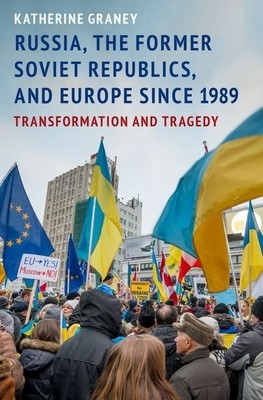
- We will send in 10–14 business days.
- Author: Katherine Graney
- Publisher: Oxford University Press, USA
- ISBN-10: 019005509X
- ISBN-13: 9780190055097
- Format: 15.2 x 22.6 x 2.3 cm, minkšti viršeliai
- Language: English
- SAVE -10% with code: EXTRA
Russia, the Former Soviet Republics, and Europe Since 1989 (e-book) (used book) | bookbook.eu
Reviews
Description
Nearly three decades after the fall of the Berlin Wall, early hopes for the integration of the post-Soviet states into a "Europe whole and free" seem to have been decisively dashed. Europe itself is in the midst of a multifaceted crisis that threatens the considerable gains of the post-war liberal European experiment. In Russia, the Former Soviet Republics, and Europe Since 1989, Katherine Graney provides a panoramic and historically-rooted overview of the process of "Europeanization" in Russia and all fourteen of the former Soviet republics since 1989. Graney argues that deeply rooted ideas about Europe's cultural-civilizational primacy and concerns about both ideological and institutional alignment with Europe continue to influence both internal politics in contemporary Europe and the processes of Europeanization in the post-Soviet world. By comparing the effect of the phenomenon across Russia and the ex-republics, Graney provides a theoretically grounded and empirically rich
window into how we should study politics in the former USSR.
EXTRA 10 % discount with code: EXTRA
The promotion ends in 21d.05:33:02
The discount code is valid when purchasing from 10 €. Discounts do not stack.
- Author: Katherine Graney
- Publisher: Oxford University Press, USA
- ISBN-10: 019005509X
- ISBN-13: 9780190055097
- Format: 15.2 x 22.6 x 2.3 cm, minkšti viršeliai
- Language: English English
Nearly three decades after the fall of the Berlin Wall, early hopes for the integration of the post-Soviet states into a "Europe whole and free" seem to have been decisively dashed. Europe itself is in the midst of a multifaceted crisis that threatens the considerable gains of the post-war liberal European experiment. In Russia, the Former Soviet Republics, and Europe Since 1989, Katherine Graney provides a panoramic and historically-rooted overview of the process of "Europeanization" in Russia and all fourteen of the former Soviet republics since 1989. Graney argues that deeply rooted ideas about Europe's cultural-civilizational primacy and concerns about both ideological and institutional alignment with Europe continue to influence both internal politics in contemporary Europe and the processes of Europeanization in the post-Soviet world. By comparing the effect of the phenomenon across Russia and the ex-republics, Graney provides a theoretically grounded and empirically rich
window into how we should study politics in the former USSR.


Reviews